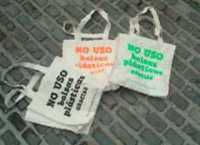The Portuguese magazine, Expresso, has alleged that top Spanish fashion group Inditex, probably best known in the UK for its Zara brand, was exploiting child labor.
Child labor is endemic in Asia and sub-Saharan Africa. However, the allegations that young children are being exploited closer to home can be seriously damaging to the reputation of manufacturers and also and especially retailers
A spokesperson for the Portuguese Footwear Union claimed that children were paid less than 30 Euro per day and that such "miserable" pay was often the sole family income.
In 2001, the Portuguese government estimated that 7000 children were employed by third parties, some for several hours a day, six or seven days a week.
Inditex responded quickly to the statements denying evidence of child labour in Portugal and the company requested the establishment of a working table with the Portuguese Labour Ministry and with Trade Unions in order to assess the "social and labour reality of the Felgueiras area".
Nike and Gap have sustained consumer backlashes after revelations of using child labour and Oxfam believes that most Nike goods are still manufactured in countries where independent trades union representation is outlawed.
It does not seem to matter much what the European Union legislation says to this, it would seem. Those companies, in the perpetual hunt for more profits for less payouts could care little about this.
There is only one way to deal with this and that is “consumer power”, in the same way as the consumer demand has brought products with the Fairtrade label into the big supermarkets. If we, the shoppers, refuse to buy brands associated with bad practice, be this the exploitation of children, the exploitation of workers, the exploitation of animals, of the environment, or whatever else. It is the power of the consumer, of the user, that can change the attitude of the manufactures and retailers.
Labels, even “ethical” labels, mean little if the consumer does not know what actually stands behind it. With the Fairtrade label we all know. With others we do not, in fact, know. What are the criteria that allow this or that product to bear this or that “ethical” label, must always be the question. Anyone wishing to know the Fairtrade deal can learn that best from the book “Fighting the Banana Wars and other Fairtrade Battles”. Do we have the same chance to know how the worker benefits, or the environment, with all the other, by now very confusing, schemes that claim this or that?
© Michael Smith (Veshengro), March 2008
Blog Archive
-
▼
2008
(56)
-
▼
March
(17)
- Citizen Journalists to be Curtailed
- Berry Nutty – Product Review
- Nicaragua Solidarity Campaign - Advert
- Fairtrade and other Ethical Labels
- BOGO LIGHT - Advertisement
- Child Labor
- Credit card data stolen from supermarket chain
- Sport Relief - Register - But HURRY!!!
- Nicaragua Solidarity Campaign - Advert
- Fighting the Banana Wars and other FAIRTRADE Battl...
- Terrorist Attack on Yeshiva in Jerusalem
- Mozzo Coffee – Product Review
- Ubuntu Cola – Product Review
- Israel's Nazi Tactics Against Gaza Residents
- BOGO LIGHT - Advertisement
- Football match to promote Fairtrade and recycling
- Nicaragua Solidarity Campaign - Advert
-
▼
March
(17)


No comments:
Post a Comment